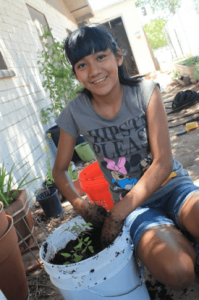MEASURING IMPACT
-
“One impact that this program has had, and will continue to have, is to help reduce the suicide rate because suicide rate in the state of Arizona, in the Indian country is the highest rate in the nation. And having these activities for kids, letting them learn and understand how things work and how they develop. It’s all a continuum and all part of wellness.”
-
“Today’s ranchers will eventually retire. In the next 10 or 15 years that 10-year-old will move into their 20s. Whether they go for higher education or not, they’ll still be able to ranch, and they’re learning all the skills now and the purpose behind it.”
FRTEP programs have had a major impact on individuals, families and tribal communities. Just how much impact has now been quantified thanks to a research project that used Ripple Effects Mapping (REM) and content analysis. The Indian Land Tenure Foundation (ILTF) engaged in a joint collaboration with an evaluation team and the Western Extension Risk Management Education Center to measure the long-term impacts of the Federally Recognized Tribal Extension Program (FRTEP) serving the Hualapai Tribe. Click the link below to read the report.
Read the report
Agriculture and natural resources
FRTEP extension on the Hualapai Reservation works closely with livestock growers to help them become more efficient in their operations. Among the specific areas of focus are agriculture, cattle ranching, record keeping, equine health and care and rangeland ecology. Among the ecology topics covered are rangeland monitoring, collecting weather data as well as the impact of drought, flooding and fire. Meetings are also held on invasive weeds, grasses, toxic plants, poisonous plants and plant identification.
Workshops are held to increase community knowledge about horticulture and encourage tribal members to get involved with various aspects of plants,. These include houseplants, fruit trees, ornamentals, gardens, flowers, herbs, pollinator plants, native plants and rangeland grasses. There are workshops on pruning, landscaping and yard maintenance, and gardening skills. New programming is being developed to target beginning ranchers and provide them with the educational information they need.

4-H Youth Development
One of the primary goals of the Hualapai FRTEP extension program is help develop leadership, responsibility and life skills in youth, through hands-on learning. One of the components of the youth program is a week-long annual summer camp that teaches youth ways to help conserve and protect natural resources for future generations, and to introduce them to career options in natural resources.
Each year during Hualapai Youth Spring Breaks, field trips are taken to Diamond Creek, the only perennial stream on the Hualapai Reservation. Participants collect and identify macro invertebrates in the stream, learn about the plants that grow in the area and help develop a poster or presentation to document what they have learned.
Seasonal programs are held at the Early Childhood Education facilities that teach children about insects, animals, planting flowers, grinding grain and baking bread. Classes are also held on arts and crafts.

